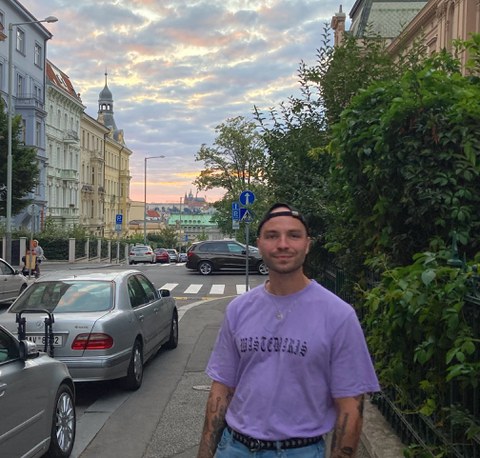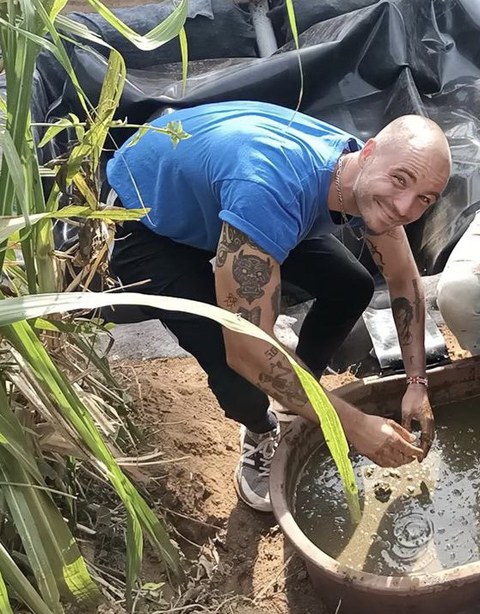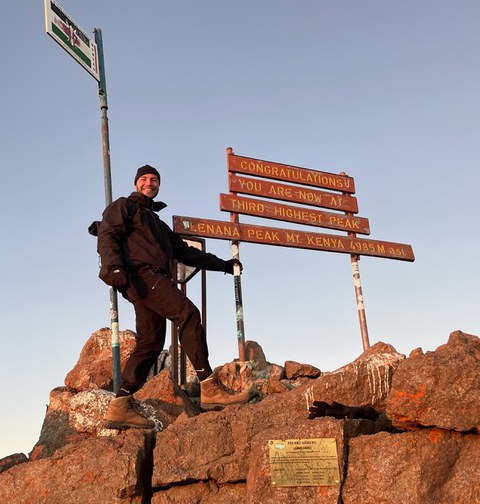Jan-Philipp Leifeld
Alumnus of the Master's program in International Management
Today: Research Associate at the TU Dresden
"... to think a little outside the box and see what is actually really important in life and also to create a sustainable basis for life, to create a living environment ..."

Jan-Philipp Leifeld in Pardubice
The hipster from West Berlin?
It's not easy to pigeonhole Jan-Philipp Leifeld, because Jan doesn't fit into any of them. The 28-year-old comes from West Berlin, trained as an insurance and finance clerk at ERGO Group AG in Potsdam, then studied business administration at the Berlin School of Economics and Law, went to Kenya and worked on a project for the Maasai community on Kilimanjaro, building wells and distributing school fees to schoolchildren. While still in Kenya, he applied for a Master's degree in International Management at the IHI in Zittau and completed his double degree at the Czech University of Pardubice, before traveling to Ghana for a few weeks shortly afterwards.
Pigeonholes make our lives easy, but anyone who puts Jan in a pigeonhole is missing out! In conversation, it becomes clear that Jan is a person with ideals. He has the talent to unite apparent opposites, dares to think in new ways and question old systems. A clever young man who wants to make a difference and knows that real encounters are important for understanding a country and its people.
Through the African bush on a motorcycle
During his bachelor's degree, Jan worked at DKB in the field of renewable energies , where he discovered his passion for sustainability and renewable energies. After graduating, he got an internship in a research workshop for renewable energies in Kenya through an association.
"I basically ran off to Africa after my bachelor's degree and spent the first three months managing a well construction project for the Maasai on Kilimanjaro. I learned to ride a motorcycle there and drove through the bush, distributed school fees to the children and sold solar panels for schools and private huts. It was incredible fun. This time shaped and inspired me so much!"
It was then at the latest that Jan realized how important these real encounters on site are:
"... especially with projects like this, where there are such cultural differences, so that you don't become blind from your desk in Germany... You have to really feel these points of contact and be there. And that's when I realized that this is actually exactly what I want to do... sustainable energy for developing countries and, above all, the topic of macroeconomic dependencies and strengthening disadvantaged economies with a sustainable perspective... ".
Definitely a Master's in International Management
Jan applied for the International Management degree program at IHI Zittau while still in Kenya. The topics of sustainability, internationality and the opportunity to obtain a double degree abroad really hit the mark with Jan. Of course, the cost of living and the border triangle between Poland, the Czech Republic and Germany are another real competitive advantage alongside the double degree, as Jan says. "If you want a room in a shared flat in Berlin, it can cost up to 650 euros and then you have to be lucky to get one."
The people in the study group here in Zittau came from different parts of the world. He found the exchange with the head of the course, Professor Stefan Eckert, and his colleagues at the chair really good. "It was always on an equal footing and, as I was the student coordinator of the degree program, I also got an insight into many of the university's processes. It was really fun and I immediately felt integrated into a great team!"
Semester abroad in Pardubice instead of St. Petersburg
Jan actually wanted to spend his semester abroad in St. Petersburg. However, as the political situation changed with Russia's attack on Ukraine, Jan had to change his plans and went to the Czech University of Pardubice instead. He drove to Pardubice via Wroclaw in his grandfather's car with a friend.
"In my opinion, the university in Pardubice is very progressive. The contact between students and professors was very direct. You were really on a first-name basis with every professor and I also made a few friends. They were totally relaxed and easy-going with the students, so you always had the feeling that you could deal with difficult topics in a cool way, especially in the Master's program. If you had a problem, you just went to their office."
Jan was particularly impressed by one person. A lecturer from Ghana who gave the International Finance lecture. Jan was totally impressed by the quality of the lectures. For him, it was like learning among friends. The lecturer from Ghana quickly realized that Jan was very interested in the subject and they discussed one or two topics in depth in intensive discussions and made references to Ghana and Kenya. This flexible adaptation of the teaching content and the special connection to Ghana and Kenya were almost too good to be true. "What I learned there was incredible! And because he told me so much about Ghana, I went to Ghana with my girlfriend for four weeks at the beginning of last year. I thought to myself that we had a great teacher from Ghana who told me so many exciting things. I have to see for myself and it was really great! I really noticed that it really helped me to understand things."
ARD Tagesschau and what is really important in life?
Jan wrote his Master's thesis on "The market for photovoltaic systems in Kenya, an analysis of market entry barriers for foreign companies". The master's thesis identified 18 barriers. He assessed these barriers according to their severity and relevance and developed a scoring model to obtain a market entry score from the perspective of German companies for market entry into the Kenyan solar market.
"And then I actually mainly looked at so many quantitative country assessment concepts. I was able to compare the indices with German indices and so I always had a point of reference. That was very exciting because I also learned a lot. I was able to apply a lot of things from my studies. The cultural dimension models alone, I used them all to see how cultural disparities are reflected. It was really cool that you could somehow really incorporate everything you had learned into this thesis."
Three days before the defense of the thesis, a report on the climate summit with a focus on Africa was broadcast on ARD-Tagesschau, which also dealt with the question of how to make it less risky for investors to enter these markets and improve living conditions. "It was clear to me that I wanted to continue my research and do my doctorate in this area."
The relevance of the topic is undisputed for Jan, precisely because so much investment flows into these countries to strengthen these markets and create livelihoods.

Jan-Philipp Leifeld Bewässerungsanalge
"We have built solar systems or irrigation systems for small huts in Africa and seen the problems people have to deal with there, where it is simply a matter of having light so that the children can also learn something in the evening. I was so shocked to see the living conditions there, but at the same time to see how happy the people are, how little consumption they actually have and that all this overconsumption that we have here only leads to people becoming more and more unhappy and wanting more and more. I say, in a habitus that we are taught from the ground up, that it is right to live like this ... to think outside the box a bit and look at what is actually really important in life and also to create a sustainable basis for life, to create a living environment - that's something that is often somehow forgotten."
And sometimes it just fits. And so it was that a project position with the possibility of a doctorate was advertised at the Faculty of Business and Economics, Chair of Business Administration, esp. Marketing, at TU Dresden. The project deals with the question of how artificial intelligence can be used to influence consumer behavior towards greater sustainability. And Jan got the job. We are delighted that Jan will be staying at TU Dresden and are sure that we will be hearing a lot more from him!

